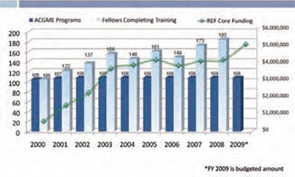This year is the 25th anniversary of the ACR Research and Education Foundation (REF), and the REF has evolved considerably since its founding in 1985.
Although the streamlining of the core awards and grants portfolio and the launch of the largest fundraising campaign in the REF’s history, Within Our Reach: Finding a Cure for Rheumatoid Arthritis are significant parts of the REF’s history, one award that is near and dear to me as a division director is the ACR REF/Amgen/Pfizer Rheumatology Fellowship Training Award.
When the training award launched about 10 years ago, fellowship funding was a great concern, and the REF was looking for ways to address this need. There was considerable discussion at the time about the amount of the individual awards and whether they should support approximately one-half or the full amount of the fellow’s salary stipend. Another hotly debated issue focused on which institutions should be given priority for these awards. Should funding be based on need? Should funds be preferentially allocated to highly productive training programs? Incidentally, these same questions are still being asked today.
Ultimately, decisions about the award were made in 2001, and recipients—rheumatology training programs—received one year of funding at $25,000, which was applied to the salary stipend of a rheumatology fellow. The first awards were given to 20 training programs in March 2002.
The REF continued to explore ways to expand its investment in rheumatology training. In 2005, Amgen, Inc., and Wyeth—now Pfizer—made a five-year commitment of $750,000 per year to support 30 awards annually. The program continues to flourish, and by July 1, the REF will have awarded approximately $5.5 million to support the salary stipends of more than 200 fellows from training programs across the country.
Has the ACR REF/Amgen/Pfizer Rheumatology Fellowship Training Award achieved its goal of expanding the rheumatology workforce? In an attempt to answer this question, let’s examine the number of graduates of our rheumatology fellowship training programs over the past 10 years.
In 2000, 105 American Council for Graduate Medical Education (ACGME)–accre-dited training programs graduated 105 fellows in rheumatology. It’s easy to do the math—an average of one fellow per year per institution. Over the past eight years, the number of ACGME-accredited training programs in rheumatology has increased only slightly from 105 to 109. However, from 2002 to 2008, the number of fellows completing training on an annual basis rose dramatically from 105 to 185—a remarkable 76% increase in the number of graduates, which is an average of nearly two fellows per year per institution (see Table 1, above right). It is only a correlation, but a good sign indeed.

